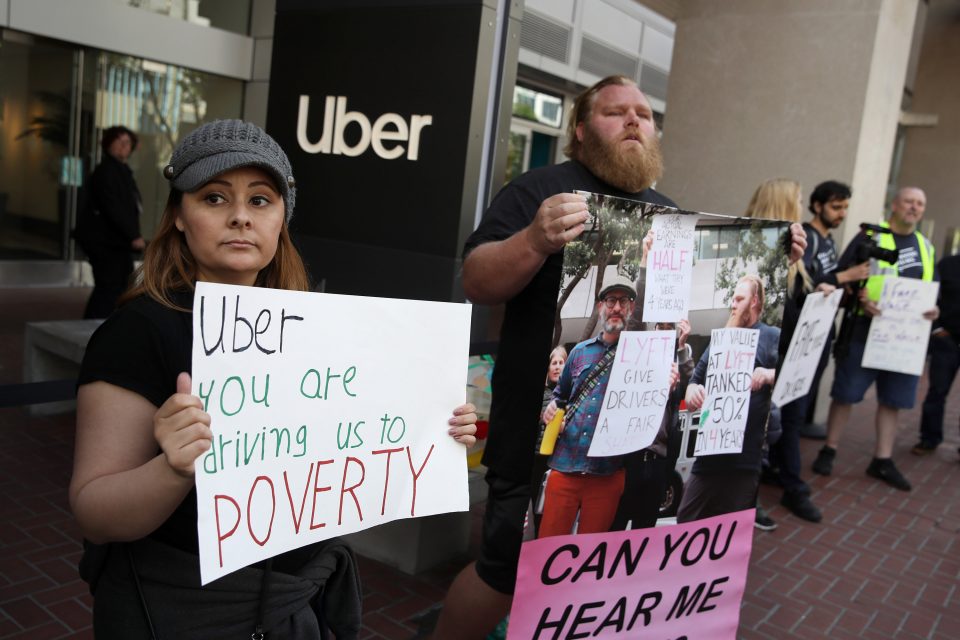Uber drivers are workers, not contractors
In the second of this three-part series on workers in the e-hailing industry, a British Supreme Court ruling could be ‘highly persuasive’ in South African Uber drivers’ class action against the tec…
Author:
15 April 2021

In almost all cities that use e-hailing transport services – from California and Johannesburg to Bogota and Paris – regulation is a highly contested issue.
This lack of regulation of the gig economy has manifested itself across the world in violent and fatal confrontations between Uber drivers and metered taxi operators. The latter view Uber and other e-hailing or transport tech companies as anti-competitive and largely unregulated.
However, the working conditions of human beings in the gig economy have been overlooked or secondary to the question of regulation.
It was the Supreme Court in the United Kingdom that put this question back on the global agenda in February with its long-awaited judgment of Uber BV vs Aslam and others.
The court had to determine “whether an employment tribunal was entitled to find that drivers whose work is arranged through Uber’s smartphone application (the Uber app) work for Uber under workers’ contracts and so qualify for the national minimum wage, paid annual leave and other workers’ rights; or whether, as Uber contends, the drivers do not have these rights because they work for themselves as independent contractors, performing services under contracts made with passengers through Uber as their booking agent.”
Part one:
The court ruled that the lower courts were correct. Uber drivers are not “independent contractors” but “workers” in terms of UK labour legislation and are entitled to the national minimum wage and leave pay.
Justice George Leggatt gave a number of factors in the judgment he wrote on behalf of the judges hearing the case that nullify the view that Uber drivers are independent contractors in the UK.
One of them was that “Uber exercises a significant degree of control over the way in which drivers deliver their services”.
Uber wholly owns the technology and although drivers own their cars, it is Uber that vets the types of car they may use, said Leggatt. He added that even the contractual terms with which drivers must comply while delivering their service are dictated by Uber.
“The remuneration paid to drivers for the work they do is fixed by Uber and the drivers have no say in it (other than by choosing when and how much to work),” he said.
The UK judgment is not the only decision to challenge the mantra of the gig economy that workers are independent contractors detached from traditional forms of employment.
Other jurisdictions on Uber’s work dynamics
France’s supreme court of appeal, the Cour de Cassation, held last year that an Uber driver should have been considered an employee and not an independent contractor. The Uber driver approached the labour court unsuccessfully in 2017 after Uber deactivated his app.
The labour court reasoned that the relationship was not that of an employer and employee. But the driver persisted in a different court in Paris, which found that he was an employee. The Cour de Cassation agreed with the lower court, saying the driver could not be considered self-employed or an independent contractor because he was a subordinate of Uber. Uber said in various media reports that this judgment didn’t have any binding force on other drivers.
Related article:
In a similar instance, the Unemployment Insurance Appeal Board of New York extended the benefits of unemployment insurance to Uber drivers. It justified this by saying “agreements characterising drivers as independent contractors are not dispositive of employer-employee relationships, but merely just one of many factors to be considered”.
The board went on to say that “the record demonstrates that Uber … selects only qualified drivers, monitors and supervises drivers’ performance, rewards high-performing drivers, disciplines drivers who fail to meet Uber’s standards on a temporary or permanent basis, sets the fare prices charged to riders and sets the driver’s fee paid to Uber”.
A Swiss court came to a similar conclusion to the UK Supreme Court, saying an Uber driver is more a worker than an independent contractor.
Drivers fall under SA legislation
The UK court judgment has been described as a turning point in relation to labour and worker rights for Uber drivers globally. In South Africa, Uber BV and its subsidiary, Uber SA, are facing a class-action lawsuit in the Johannesburg labour court.
The attorney representing Uber drivers, Zanele Mbuyisa, said the “claim will be based on the drivers’ entitlement to rights as employees under South African legislation and will seek compensation for unpaid overtime and holiday pay.
“The UK Supreme Court judgment is not binding on the South African court but will be highly persuasive. The terms and conditions under which South African Uber drivers work are factually very similar to the situation in the UK. Furthermore, South African employment law is very similar to English law in relation to the legal test for determining workers.”
An Uber spokesperson disagreed with this position, saying UK employment law is different to that of South Africa.
Related article:
“It is important to note that the UK case is about ‘worker status’, which is unique to the UK … A ‘worker’ is essentially an intermediate status between self-employed and employee, with certain benefits and entitlements.” The spokesperson went on to say that “there is no legal framework for worker status in South Africa”.
The Competition Commission highlighted the impact of not having a labour regulatory framework around e-hailing services in a report on metered taxis and e-hailing services that formed part of a market inquiry into land-based public passenger transport.
“The effect of lack of labour law regulation puts e-hailing companies in a position where they determine the rules of engagement with the operators. E-hailing operators are often in a weaker bargaining position and have no pension, sick leave or decent work conditions. These operators allege that they can have their accounts deactivated from the platform without any recourse and work long hours in order to secure decent earnings and have no influence in fare setting despite the fact that they own the vehicles and they are subjected to all operating costs,” says the report.
Mbuyisa said they will rely on the commission’s report to make their case, because the “findings are based on submissions from a number of parties, including Uber drivers and Uber itself, and will therefore serve as useful evidence relating to the working conditions and earnings of Uber drivers in South Africa”.
Despite being in the same industry, the lawsuit does not cover drivers using other e-hailing transport apps such as Bolt, she said.
Why a class-action lawsuit?
Mbuyisa said they chose an opt-out class action to challenge Uber because it is “efficient, speedy and cost-effective. In this case, a small number of representative driver plaintiffs would be claiming on behalf of all Uber SA drivers. If there are drivers who do not want to be part of the case, they will have an opportunity to opt out of it.”
In other jurisdictions, like the UK, a driver will have had to instruct a lawyer to be part of the class action, she said. However, in this instance, drivers will enjoy the benefits and protection of the outcome without having to have instructed a lawyer from the beginning.
The class action has the potential, Mbuyisa estimated, to benefit 12 000 to 20 000 Uber drivers in the event that they don’t opt out of the lawsuit. Unlike in other countries, where drivers use the Uber platform to supplement their income, in South Africa most Uber drivers work full-time because of the high levels of unemployment and lack of job opportunities in the country.
An Uber spokesperson said, regarding unemployment, that “we believe Uber and other platforms can be a bridge to a sustainable economic recovery. Uber has already produced thousands of sustainable economic opportunities. This is testament to the appeal of the Uber business model, which provides drivers with an independent status while allowing them to develop and expand their businesses following their needs and time schedules, as well as their business skills and plans, and pursue any economic activities of their choice.”
Related article:
Mbuyisa Moleele Attorneys is handling the case pro bono, meaning drivers won’t have to pay legal fees and the law firm “will not be taking money from any damages recovered” by drivers in the event that they are successful, said Mbuyisa. But they will pursue legal costs against Uber.
In relation to the “class action in SA, no legal steps have been taken. Uber will take time to review this and their next steps, meanwhile the Uber app will continue to work as normal for both riders and drivers,” said the Uber spokesperson.
London-based law firm Leigh Day, which represented Uber drivers in the landmark UK judgment, is assisting Mbuyisa’s firm as it takes on the multibillion-dollar tech giant.
Class-action litigation can take several years to reach trial, but it is possible that Uber may decide to settle the case earlier than that, said Mbuyisa.
Uber said it is “committed to engaging and working with governments to try to update existing legal frameworks, to include benefits and protections for independent contractors without removing the flexibility and independence that attracted them to use Uber in the first place.”
In part three, Uber drivers share their experiences and the conditions under which they work.




